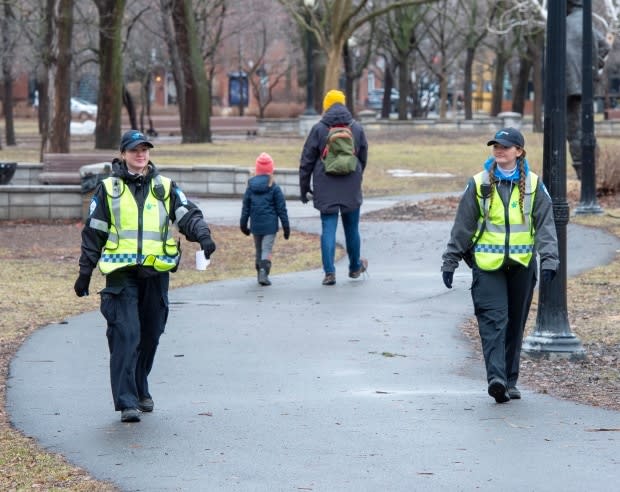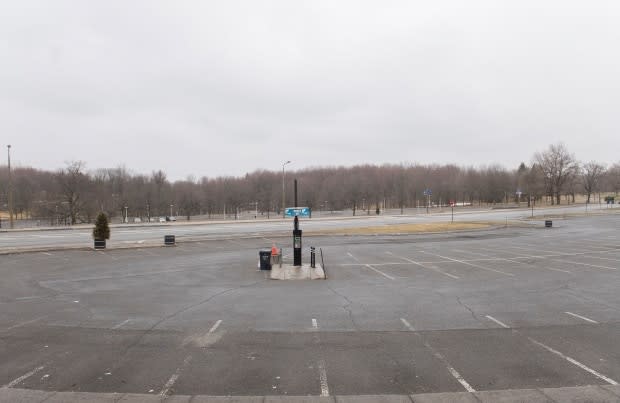Quebec extends halt on non-essential activity to May 4, province approaches 8,000 cases

The city has closed Île Notre-Dame and parking at Mont-Royal Park.
All business except dépanneurs, gas stations and pharmacies are closed today.
The shutdown of non-essential economic activity in Quebec will last at least another month, and won't end on April 13 as the provincial government had initially hoped.
Premier François Legault said given the continued rise in the number of new cases of COVID-19, Quebecers should expect businesses to remain closed until May 4.
"If we relax our efforts, we'll just delay the moment when we'll be able to go back to our lives," Legault said Sunday at the government's daily news conference in Quebec City.
"The battle is far from over. In fact, we're entering the decisive phase of this battle."
Public health officials announced Sunday there were 947 newly confirmed cases of COVID-19 in Quebec, bringing the total in the province to 7,944. Percentage wise, that's one of the lower daily increases of the past two weeks.
Hospitalizations also appear to be increasing at a weaker rate than earlier in the crisis. But 19 more people have died from causes related to the disease, bringing the overall number of deaths in Quebec to 94.
As long as the number of new cases is increasing, Legault said, the government's priority will remain protecting the public's health, even if it means enforcing measures that are painful for businesses.
The province is likely still several weeks away from hitting its peak number of cases, Legault said. Only after that will his government consider relaxing its strict physical distancing policies.
"We put all our effort in the public's health because we needed to allow the health-care system to get ready to handle the first wave," Legault said.
"I'm looking forward to getting over that peak. That's when we'll begin looking at which businesses and organizations to re-open."

Businesses groups in the province met the news with mixed emotions. The Conseil du Patronat called the extension a "necessary evil."
Veronique Proulx, head of the Quebec Manufacturers and Exporters Association, worried about the ground businesses in the province were losing to competitors in the U.S. and rest of Canada, where restrictions have been less severe.
"Our concern is that SMEs (small and medium-sized enterprises) in Quebec will lose contracts and market share," Proulx said.
Preparing for the post-COVID economy
In an effort to ease the pain of a longer lockdown, the Quebec government revealed details of an ambitious buy-local program called Panier Bleu.
Economy Minister Pierre Fitzgibbon, who joined Legault at Sunday's news conference, compared the initiative to an Amazon-style inventory that will allow Quebecers to search online for products made in the province and buy them directly from retailers.

"It's an approach to unite communication channels to allow our small businesses to compete with corporations that have huge marketing resources," Fitzgibbon said.
The government has been indicating it wants to use the coming months to re-tool the Quebec economy in order to make it better suited to the post-COVID world.
Legault and Fitzgibbon said they anticipate supply chains will remain unstable for years to come and that global trade will be hampered by protectionism.
The government's long-term goal, they said, is to make the provincial economy more self-sufficient and less dependent on imports.
"I think the public-health crisis allowed us to realize to what point we needed an ambitious strategy for local businesses and e-commerce. We want to make that a priority," Fitzgibbon said.
Legault pointed in particular to the need for making Quebec's health-care industry, which is struggling to find supplies abroad, and the agriculture sector, which is dependent on foreign workers, more autonomous.
More powers for police to fine people, Île Notre-Dame closed
The prospect of a longer shutdown, and continued physical distancing, will not be easy for many Quebecers to swallow, especially as the weather continues to warm.
Scores of people flocked to Montreal's parks on Saturday to enjoy the sun and mild temperatures, despite public health directives against public and private gatherings.

Montreal police had beefed up their presence in public spaces and reportedly fined people who were not respecting the physical distancing guidelines.
Police informed City Hall that many of the people in Montreal's downtown parks were from suburbs on the north and south shore, raising concerns about the disease spreading further.
"That's not what we wanted," Mayor Valérie Plante said Sunday. "We want people to stay close to their homes."
As a result, the city announced it was closing one vast green space — Île Notre-Dame — and shutting the parking lot at another, Mount Royal Park.
The measure was necessary, Plante said, in order to keep Montreal parks empty enough for Montrealers who live in apartment buildings or condominiums to be able to use them.
Access to green space will be essential to allow people to cope with an extended period without bars, restaurants and municipal facilities, she said. But if public health directives aren't followed, she warned she would close other parks as well.
"It's a difficult time for everybody, that's for sure," Plante said. "My desire to keep public spaces and parks open is part of that."


